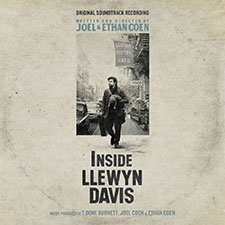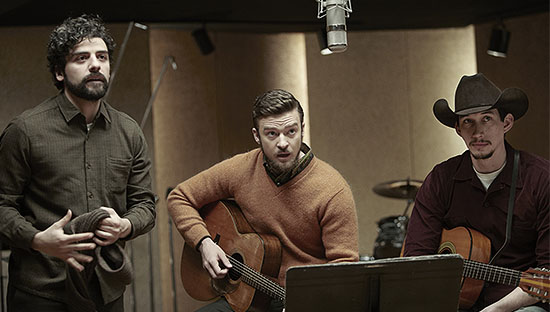
 BUY FROM AMAZON: CLICK HERE!
BUY FROM AMAZON: CLICK HERE!
MSRP $13.31
LABEL Nonesuch
RUNNING TIME 42 Minutes
AVAILABLE ON VINYL? Yes
Llewyn Davis is an asshole. He begins the film as an asshole, and I don’t know if he’s any less of an asshole by the end. What I do know, however, is that Llewyn Davis is one talented asshole, thanks to an outstanding job by leading man Oscar Isaac. Prior to his role as Llewyn, I’d never seen him carry a film. He was good in Drive, but didn’t get much to do. Some of us heard him sing Roxy Music’s Love is the Drug over the end credits of Sucker Punch, which came from a deleted musical sequence which was smartly re-inserted into the (barely) superior extended cut. That sequence might be the best thing about Sucker Punch, because it almost turns the film into a musical, and it proves that Oscar Isaac can sing his ass off.
We shouldn’t be surprised that Oscar Isaac can sing so well. After all, the guy is a Juilliard graduate. What really surprised me about his performance in Inside Llewyn Davis is that all of his guitar work on-screen appeared to be real. He’s really strumming and picking the correct patterns, really fingering the correct chords. As a guitar player myself, that blew my tiny mind. Not only was this guy acting his ass off, singing his ass off, he was also really playing the guitar, and playing it well. It’s easy enough to fake playing an instrument on screen: keep the actor’s hands out the frame, and strategically cut to some insert shots of a musician’s hands. But not here. Oscar Isaac is the real deal, and you won’t know how real he his unless you see the film. He brings Llewyn to life in a way that is completely disarming.
Inside Llewyn Davis is one of the best films about musicians in recent memory, and it’s only fitting that T-Bone Burnett, producer of the soundtrack to O Brother, Where Art Thou? and countless other great albums, should produce the music for it. Burnett’s mere presence in a recording studio seems to lend an intangible authenticity to the music being made. If you’ve hear enough of the music he’s produced, you can start to pick up signature textures, like the silky analog reverb and rich, twangy guitar work. He’s also got a great sense of minimalism, often stripping instrumentation back to the bare essentials, so that each element is not just audible, but sounds present in the room.
One such track is Hang Me, Oh Hang Me, the first song on the soundtrack album, which also serves as the film’s enrapturing opener. The song is a traditional folk tune, which means nobody knows exactly who wrote it, and it probably dates back a long time. Isaac plays and sings solo on this one, and it’s beautiful and raw. The sense of intimacy that is conveyed in the film’s opening scene is instantly replicated in the song, but again, you’ll have to see the film to get the same goosebumps I’m getting right now.
 The next track on the album, Fare Thee Well (Dink’s Song), another traditional tune, is my favorite track on the album. Marcus Mumford, hubby of co-star Carey Mulligan, joins Oscar Isaac on vocal duties, and they harmonize like they’ve been singing together for years. I’m not a Mumford and Sons fan, mostly because they sound I’m being chased by an army of aggressively strumming bluegrass players. But here, Mumford shines. He and Isaac are backed up by three of the best bluegrass players currently walking the earth: Chris Eldridge (guitar), Gabe Witcher (fiddle), and literal mandolin genius Chris Thile. These three virtuosos are members of Punch Brothers, one of my favorite bands ever. They each get their moments to shine, and the song so closely nears perfection that I might as well just call it perfect.
The next track on the album, Fare Thee Well (Dink’s Song), another traditional tune, is my favorite track on the album. Marcus Mumford, hubby of co-star Carey Mulligan, joins Oscar Isaac on vocal duties, and they harmonize like they’ve been singing together for years. I’m not a Mumford and Sons fan, mostly because they sound I’m being chased by an army of aggressively strumming bluegrass players. But here, Mumford shines. He and Isaac are backed up by three of the best bluegrass players currently walking the earth: Chris Eldridge (guitar), Gabe Witcher (fiddle), and literal mandolin genius Chris Thile. These three virtuosos are members of Punch Brothers, one of my favorite bands ever. They each get their moments to shine, and the song so closely nears perfection that I might as well just call it perfect.
Now before I go spinning too far into hyperbole, I do think there’s one big potential negative to the music of Inside Llewyn Davis. I don’t think the soundtrack truly works without the context provided by the film. The songs don’t mean as nearly as much on their own, especially the hilariously naïve satire Please Mr. Kennedy, which is played entirely for laughs in the film. The song’s refrain goes like this:
Please, Mr. Kennedy (uh-oh)
I don’t wanna go
Please don’t shoot me into outer space
Yes, it sounds as silly as it looks, and hearing Adam Driver bellow “UH-OH!” in his I-just-drank-a-glass-of-milk baritone is weird and jarring, but intentionally so. After seeing the film, the song carries the memory of seeing Llewyn’s reaction to this hysterically awful song, and it is bestowed with new meaning.

The same is true of Five Hundred Miles, a sweet Hedy West song made tooth-shatteringly saccharine by the vocal performances Justin Timberlake, Carey Mulligan, and Stark Sands. They harmonize just a bit too closely, they all sound too demure and angelic to be real. It lacks the truth and rawness of Llewyn’s music, and the song is intentionally presented in this manner to help define their characters, who stand in stark contrast to our perpetually miserable protagonist.
The bottom line about Inside Llewyn Davis and its soundtrack is that both are superb, but they inseparable in a way that one fails without the other. The film wouldn’t be so goddamn good without its soundtrack, but the soundtrack alone lacks valuable context that the film imparts. They are part and parcel, and serve as the perfect vehicle for an unlikely leading man to give one of the year’s best performances. If you are musician and film lover, you owe it to yourself to see Inside Llewyn Davis while it’s still in theaters. Oh, and if you haven’t gotten the message yet: buy this soundtrack.